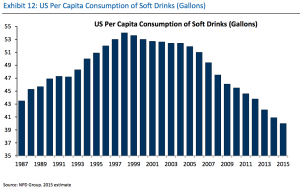The consumption of sugary soda drinks has collapsed in the US from a high of about 54 gallons per person in the late 90’s to about 40 gallons in 2015. This has prompted soda manufacturers to respond, not necessarily by producing healthier beverages, but by at least marketing unhealthy drinks as having health benefits. In 2009 the Center for Science in the Public Interest sued Coca Cola over its Vitaminwater and the  unsubstantiated and exaggerated health claims they made over it. Six years later, the suit settled with Coke promising to make some significant changes. This month we bring you a story of an intersection between Health, Business and Law, and how our society is coping on all fronts…
unsubstantiated and exaggerated health claims they made over it. Six years later, the suit settled with Coke promising to make some significant changes. This month we bring you a story of an intersection between Health, Business and Law, and how our society is coping on all fronts…
The Dark Side of Vitaminwater,
by John Robbins on HuffPost, Aug 2010
Now here’s something you wouldn’t expect. Coca-Cola is being sued by a non-profit public interest group, on the grounds that the company’s vitaminwater products make unwarranted health claims. No surprise there. But how do you think the company is defending itself?
In a staggering feat of twisted logic, lawyers for Coca-Cola are defending the lawsuit by asserting that “no consumer could reasonably be misled into thinking vitaminwater was a healthy beverage.”
Does this mean that you’d have to be an unreasonable person to think that a product named “vitaminwater,” a product that has been heavily and aggressively marketed as a healthy beverage, actually had health benefits?
Or does it mean that it’s okay for a corporation to lie about its products, as long as they can then turn around and claim that no one actually believes their lies?
In fact, the product is basically sugar-water, to which about a penny’s worth of synthetic vitamins have been added. And the amount of sugar is not trivial. A bottle of vitaminwater contains 33 grams of sugar, making it more akin to a soft drink than to a healthy beverage.
Is any harm being done by this marketing ploy? After all, some might say consumers are at least getting some vitamins, and there isn’t as much sugar in vitaminwater as there is in regular Coke.
True. But about 35 percent of Americans are now considered medically obese. Two-thirds of Americans are overweight. Health experts tend to disagree about almost everything, but they all concur that added sugars play a key role in the obesity epidemic, a problem that now leads to more medical costs than smoking.
How many people with weight problems have consumed products like vitaminwater in the mistaken belief that the product was nutritionally positive and carried no caloric consequences? How many have thought that consuming vitaminwater was a smart choice from a weight-loss perspective? The very name “vitaminwater” suggests that the product is simply water with added nutrients, disguising the fact that it’s actually full of added sugar.
The truth is that when it comes to weight loss, what you drink may be even more important than what you eat. Americans now get nearly 25 percent of their calories from liquids. In 2009, researchers at the Johns Hopkins Bloomberg School of Public Health published a report in the American Journal of Clinical Nutrition, finding that the quickest and most reliable way to lose weight is to cut down on liquid calorie consumption. And the best way to do that is to reduce or eliminate beverages that contain added sugar.
Meanwhile, Coca-Cola has invested billions of dollars in its vitaminwater line, paying basketball stars, including Kobe Bryant and Lebron James, to appear in ads that emphatically state that these products are a healthy way for consumers to hydrate. When Lebron James held his much ballyhooed TV special to announce his decision to join the Miami Heat, many corporations paid millions in an attempt to capitalize on the event. But it was vitaminwater that had the most prominent role throughout the show.
The lawsuit, brought by the Center for Science in the Public Interest, alleges that vitaminwater labels and advertising are filled with “deceptive and unsubstantiated claims.” In his recent 55-page ruling, Federal Judge John Gleeson (U.S. District Court for the Eastern District of New York), wrote, “At oral arguments, defendants (Coca-Cola) suggested that no consumer could reasonably be misled into thinking vitamin water was a healthy beverage.” Noting that the soft drink giant wasn’t claiming the lawsuit was wrong on factual grounds, the judge wrote that, “Accordingly, I must accept the factual allegations in the complaint as true.”
I still can’t get over the bizarre audacity of Coke’s legal case. Forced to defend themselves in court, they are acknowledging that vitaminwater isn’t a healthy product. But they are arguing that advertising it as such isn’t false advertising, because no could possibly believe such a ridiculous claim.
I guess that’s why they spend hundreds of millions of dollars advertising the product, saying it will keep you “healthy as a horse,” and will bring about a “healthy state of physical and mental well-being.”
Why do we allow companies like Coca-Cola to tell us that drinking a bottle of sugar water with a few added water-soluble vitamins is a legitimate way to meet our nutritional needs?
Here’s what I suggest: If you’re looking for a healthy and far less expensive way to hydrate, try drinking water. If you want to flavor the water you drink, try adding the juice of a lemon and a small amount of honey or maple syrup to a quart of water. Another alternative is to mix one part lemonade or fruit juice to three or four parts water. Or drink green tea, hot or chilled, adding lemon and a small amount of sweetener if you like. If you want to jazz it up, try one-half fruit juice, one-half carbonated water.
If your tap water tastes bad or you suspect it might contain lead or other contaminants, get a water filter that fits under the sink or attaches to the tap.
And it’s probably not the best idea to rely on a soft drink company for your vitamins and other essential nutrients. A plant-strong diet with lots of vegetables and fruits will provide you with what you need far more reliably, far more consistently — and far more honestly.
Vitaminwater Settlement Approved by Court,
by the Center for Science in the Public Interest, Apr 2016
A court has given its final approval to a settlement agreement reached in a multi-year legal dispute over the marketing and advertising of Coca-Cola’s Vitaminwater line of beverages.
On behalf of consumers, the nonprofit Center for Science in the Public Interest and two law firms filed a class action lawsuit against Coca-Cola in 2009 to prohibit claims that the drinks, which contain about 32 grams of sugar, could reduce the risk of eye disease, promote healthy joints, induce feelings of relaxation, or otherwise bring about a “healthy state of physical and mental being.”
The agreement approved yesterday by Magistrate Judge Robert M. Levy of the United States District Court for the Eastern District of New York bars Coca-Cola from making those health claims in connection with Vitaminwater, as well as such statements as “vitamins + water = what’s in your hand,” “vitamins + water = all you need,” and “this combination of zinc and fortifying vitamins can … keep you healthy as a horse.” The company will also prominently add the words “with sweeteners” on two places on the label where the brand’s name appears.
“We’re pleased to have a resolution that improves the labeling and marketing of Vitaminwater and will help consumers recognize that the drink contains eight teaspoons of sugar,” said CSPI litigation director Maia Kats.
The order granted yesterday also found that two objections raised to the settlement were without merit.
Besides CSPI, the class was represented by Michael Reese of Reese LLP and Deborah Weintraub of Scott & Scott LLP.
CSPI, independent of the litigation, has campaigned to reduce the prevalence of added sugars in the American diet. The American Heart Association recommends a limit of nine teaspoons of added sugars per day for men and six teaspoons per day for women. Sugar drinks promote diabetes, weight gain, heart disease, tooth decay, and other health problems.
Digging Deeper…
Coca-Cola just revealed the future of its business is very different from its signature product, by Kate Taylor in Business Insider, Nov 2015
The epic collapse of American soda consumption in one chart, by Elena Holodny in Business Insider, Mar 2016












